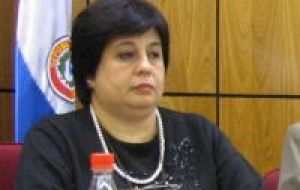MercoPress. South Atlantic News Agency
Mercosur organized joint program to combat dengue
 Paraguay’s Public Health minister, Esperanza Martinez
Paraguay’s Public Health minister, Esperanza Martinez Mercosur will consider next June adopting a regional joint program to combat the mosquito transmitted dengue disease, which has become endemic in the group with the exception of Uruguay, and which has forced landlocked Paraguay to declare a national emergency.
The announcement was made by Argentina’s Deputy Health minister Eduardo Bustos Villar at the Mercosur administrative headquarter offices in Montevideo.
“The strong integration of government efforts with those from the civil society and different communities are essential to address the growing complex sanitary situation in the region’s countries”, said Bustos Villar.
He added that the joint program which could be financed with Mercosur Structural Cohesion Fund, (FOCEM), should help with funds to strengthen and facilitate dengue disease prevention and control actions which would be in addition to those already implemented by each of the country’s Health ministries.
FOCEM already has a successful experience with the financing of a regional program to fight foot and mouth disease, (PAMA), coordinated from Montevideo and regional offices in each of the countries.
The Program has helped to finance the acquisition of vehicles and vaccines for the development on the field regional prevention seminars and the construction of sanitary posts. The Argentine proposal is to repeat the positive PAMA experience in the fight against dengue.
Earlier in the week Bustos Villar was in Asunción and met with Paraguayan Health Minister Esperanza Martinez and ratified Argentina’s full support to Paraguay in all prevention and combat actions against dengue.
“Dengue is a common concern and for this problem there are no borders, so we must work united”, said Bustos Villar in Asunción.
“We analyzed the situation in Paraguay and that of neighbouring countries which also are suffering outbreaks of the disease”, underlined the Argentine official.
Paraguayan authorities have admitted that the current bout of dengue is the worst in years with 30 deaths, 7.000 confirmed cases and another 30.000 suspects.
Dengue fever also known as break-bone fever is an infectious tropical disease caused by the dengue virus. Typical symptoms include fever, headache, skin rash and muscle and joint pains; in a small proportion the disease progresses to life-threatening complications such as dengue hemorrhagic fever (which may lead to severe hemorrhage) and dengue shock syndrome (where a very low blood pressure can cause organ dysfunction).
Dengue is usually transmitted by the mosquito Aedes aegypti. The virus exists in four different types, and an infection with one type usually gives lifelong immunity to that type, but only short-term immunity to the others. There is currently no available vaccine but measures to reduce the habitat and the number of mosquitoes, and limiting exposure to bites, are used to decrease the incidence of dengue.
Treatment of acute dengue is supportive, using either oral or intravenous re-hydration for mild or moderate disease, and intravenous fluids and blood transfusions for more severe cases. Dengue is currently endemic in more than 110 countries.




Top Comments
Disclaimer & comment rules-

Read all commentsSensible,
Apr 18th, 2011 - 09:22 pm 0four nations working together.
Mercosur PLUS CAN would have been better, though - you know - Unasur.
Its almost like the old colonial & post-colonial days in Africa, controlling first Malaria and then Rindepest.
One L, one W, no score-draw.
When countries work together lots of things are possible, but with diseases that respect no national borders, co-operative vigilance is a 'forever ' thing.
Perhaps disease control is THE THING that will glue South America together.
Commenting for this story is now closed.
If you have a Facebook account, become a fan and comment on our Facebook Page!